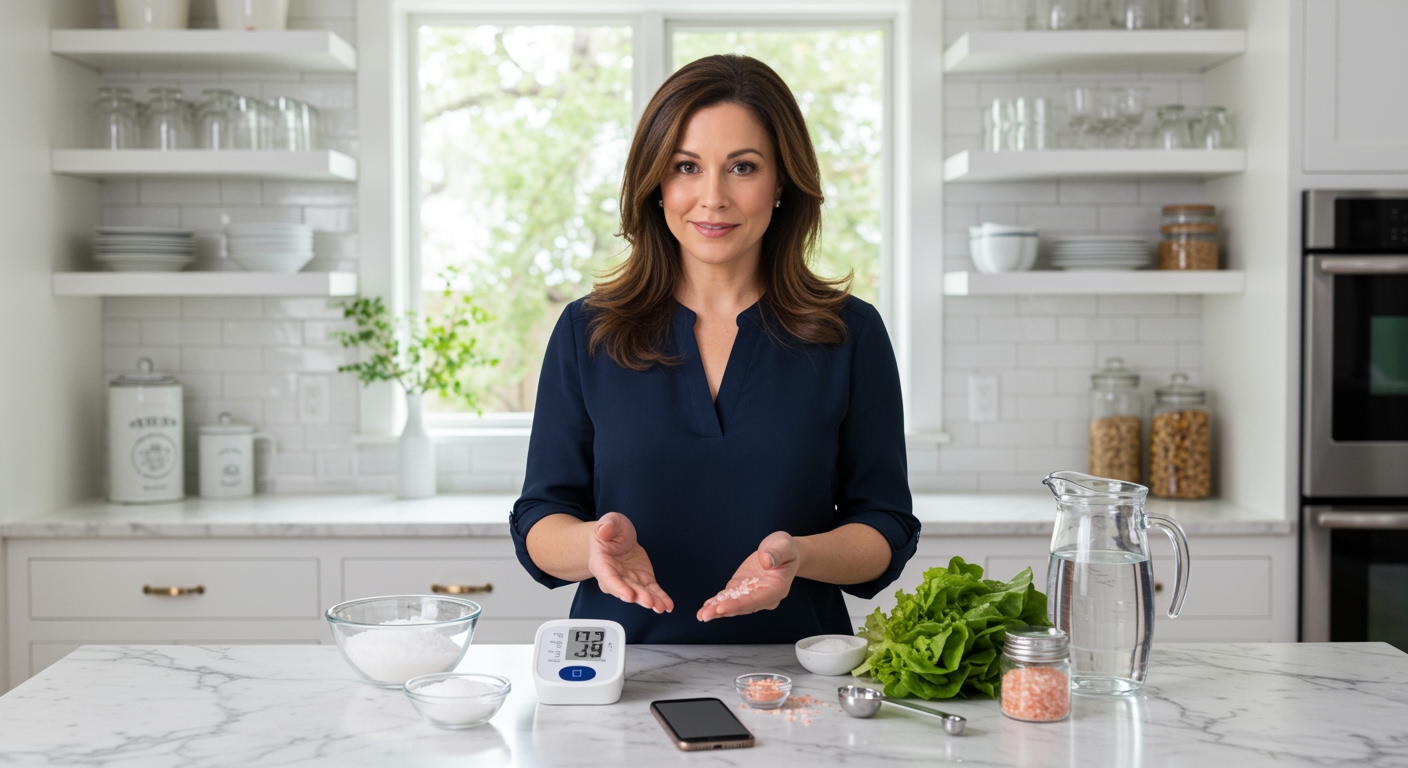✪ Key Takeaway: Salt is not inherently bad for PCOS, but excess sodium can worsen insulin resistance and blood pressure issues.
Introduction
You hear it everywhere: salt is the enemy of PCOS.
Women with PCOS get told to avoid salt like it will instantly spike their hormones and blood pressure through the roof.
Hi, I’m Abdur, your nutrition coach and today I’m going to explain the real relationship between salt and PCOS so you can make informed decisions about your health.
Does Salt Actually Worsen PCOS Symptoms?
Salt itself does not directly cause or worsen PCOS symptoms like irregular periods or excess hair growth.
However, excessive sodium intake can create a cascade of problems that make PCOS management more difficult.
High sodium consumption leads to water retention, which can mask weight loss efforts and make you feel bloated and uncomfortable.
The bigger concern is how excess salt affects insulin sensitivity in women with PCOS.
Research shows that high sodium intake can worsen insulin resistance, which is already a major problem for 70-80% of women with PCOS.
When your cells become more resistant to insulin, your body produces more of this hormone to compensate.
Higher insulin levels then trigger your ovaries to produce more androgens like testosterone, which worsens PCOS symptoms.
✪ Fact: Women with PCOS have 2-3 times higher risk of developing high blood pressure compared to women without PCOS.
How Much Salt Is Too Much With PCOS?
The American Heart Association recommends no more than 2,300 mg of sodium per day for healthy adults.
For women with PCOS who have high blood pressure or insulin resistance, the ideal target drops to 1,500 mg daily.
To put this in perspective, one teaspoon of table salt contains about 2,300 mg of sodium.
Most Americans consume 3,400 mg of sodium daily, which is nearly double the recommended amount.
The problem is not the salt you add to your food at home.
About 70% of dietary sodium comes from processed foods and restaurant meals.
A single serving of canned soup can contain 800-1,200 mg of sodium, which is already half your daily limit.
✪ Pro Tip: Read nutrition labels and choose products with less than 140 mg sodium per serving whenever possible.
Can Cutting Salt Completely Help PCOS?
Eliminating salt entirely is not necessary and can actually be counterproductive for women with PCOS.
Your body needs sodium for proper nerve function, muscle contractions, and maintaining fluid balance.
Going too low on sodium can lead to headaches, fatigue, muscle cramps, and even worsen insulin sensitivity.
The key is finding the sweet spot between too much and too little.
Studies show that moderate sodium reduction (not elimination) can improve blood pressure and reduce inflammation in women with PCOS.
Focus on reducing processed foods rather than avoiding all salt.
This approach naturally lowers your sodium intake while ensuring you get enough for optimal body function.
✪ Note: Sudden drastic sodium reduction can cause your body to retain more water temporarily as it adjusts.
What Type Of Salt Is Best For PCOS?
All salt contains sodium, so the type matters less than the total amount you consume.
However, some varieties offer slight advantages for women with PCOS.
Sea salt and Himalayan pink salt contain trace minerals like magnesium and potassium that may help with blood pressure regulation.
These minerals are present in tiny amounts though, so do not expect dramatic health benefits.
Regular table salt is fortified with iodine, which supports thyroid function.
Since women with PCOS have higher rates of thyroid disorders, getting adequate iodine is important.
The bottom line is that portion control trumps salt type every time.
✪ Fact: Potassium helps counteract sodium effects on blood pressure, so eating potassium-rich foods like bananas can help.
How To Reduce Salt Without Losing Flavor?
Reducing sodium does not mean eating bland, tasteless food for the rest of your life.
Herbs and spices can add incredible flavor without any sodium.
Garlic, onion powder, cumin, paprika, and black pepper can make any dish delicious.
Citrus juices like lemon and lime add brightness that makes you forget about salt.
Vinegars, especially apple cider vinegar, provide tangy flavor while potentially helping with insulin sensitivity.
When cooking at home, add salt at the end of cooking rather than during the process.
This technique allows you to use less salt while still getting the flavor impact on your taste buds.
✪ Pro Tip: Your taste buds adapt to lower sodium levels within 2-3 weeks, making reduced-salt foods taste normal again.
The Bottom Line
Salt is not the villain it is made out to be for women with PCOS, but moderation is key to managing your symptoms effectively.
Health is about balance, not elimination – and this applies perfectly to salt consumption with PCOS.
I would love to hear about your experiences with salt and PCOS management, so please share your thoughts or questions in the comments below.
References
At NutritionCrown, we use quality and credible sources to ensure our content is accurate and trustworthy. Below are the sources referenced in writing this article:
- PCOS Nutrition: High Blood Pressure and PCOS
- PMC: Dietary sodium intake and health indicators
- Frontiers in Endocrinology: Nutritional Management of PCOS
- Healthline: PCOS Diet Guide





